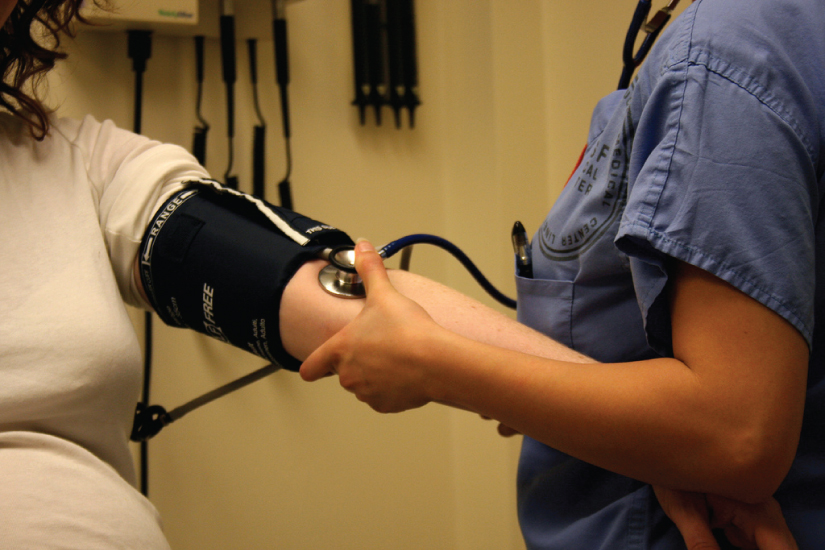By recent ASU nutrition student Alysia Nelson
Part of an ongoing series of articles on the Ketogenic Diet
Blood pressure is an indicator of how healthy our arteries and heart are. Understanding a blood pressure reading gives us an idea of how the heart is working with the blood vessels. Blood pressure is measured in two readings: the top number(systolic) over the bottom number (diastolic).1 A systolic reading is measured at the point of a heartbeat (systole) and the diastolic reading is measured when the heart rests in between beats (diastole).1 In a person with high blood pressure, there is more strain on the heart and arteries, causing them to become weaker. Over time the arteries become thicker, less flexible, and narrow allowing them to become clogged.1 If the arteries become completely clogged, a blood clot is formed increasing the risk of heart attack, stroke, kidney disease, or dementia.1 High blood pressure typically goes unnoticed, without signs or symptoms present causing it to be a silenced danger. Almost half of Americans over 20 live with high blood pressure and many don’t even know.2 Although detrimental, blood pressure can easily be checked and managed. A ketogenic diet could present as a treatment diet for decreasing the risk of heart disease by reducing blood pressure.3

High blood pressure, also known as hypertension, makes the heart work harder than it needs to.4 This strain in the cardiovascular system causes serious health complications. There are many contributing risk factors for hypertension including age, race, family history, being overweight, being sedentary, using tobacco, having a poor diet, drinking too much alcohol, certain chronic conditions, and experiencing high levels of stress.4 The longer hypertension goes untreated, the greater damage it causes leading to heart attack or stroke, aneurysm, heart failure, weakened and narrowed blood vessels in your kidneys, thickened, narrow or torn vessels in the eyes, metabolic syndrome, and trouble with memory or understanding.4 In studies of a Ketogenic diet’s effect on blood pressure, a reduction in systolic and/or diastolic blood pressure is noted.5 Why is this?
In a Ketogenic diet, a person consumes 70% of calories from fat, 20% from protein, and 5% from carbohydrates. There is also a focus on consuming unprocessed foods. What do we know about fat and the heart? Fat is a major source of energy for the body allowing better absorption of vitamins and minerals.6 It is needed to build cell membranes, essential for blood clotting, muscle movement, and inflimation.6 There are, however, good fats and bad fats and it is important to understand the difference. While all fats have a similar chemical structure, the length and shape of these structures forms crucial differences in form and function. The worst fat of them all, trans fats, are engineered from a process called hydrogenation, turning healthy oils into solids. Consuming trans fats increases the LDL “bad” cholesterol levels in the bloodstream and decreases HDL “good” cholesterol leading to heart disease, stroke, diabetes, and other chronic conditions.6 Saturated fats get a bad reputation for being a contributor to high cholesterol, however there has not been enough evidence to conclude that saturated fat increases the risk of heart disease leaving saturated fats in the grey area of fats.6 The healthiest fats of them all? Monounsaturated and polyunsaturated fats both earning its name as “heart-healthy” fats for increasing good cholesterol and decreasing bad cholesterol.6
A study posted in the National Center for Biotechnology and Information (NCBI) shows the relationship of a high-fat, low-carb diet and the reduction of blood pressure in hypertensive rats.7 In another study published in the NCBI, a diet high in sucrose and glucose (carbohydrates) increased blood pressure tremendously while certain “heart-healthy” fats and proteins decreased blood pressure.8 Since we know that a ketogenic diet limits the amount of carbohydrates, sugar is not a worrisome factor. We also know that a ketogenic diet encourages the consumption of healthy fats and the elimination of trans fats, making it a possible diet to treat high blood pressure.
A ketogenic diet has proven to decrease the risk of certain diseases and could possibly be a useful diet to prevent high blood pressure and heart disease. Although more studies need to be done before this diet becomes labeled as a treatment, it can still logically serve an ideal diet for maintaining a healthy weight and decreasing risk factors associated with poor nutrition. Nonetheless, a ketogenic diet can be used as a nutritional approach eliminating the need for drug therapy. What could be more beneficial than taking a natural approach to treat and possibly cure a disease?
1 Why it matters. (n.d.). Retrieved from http://www.bloodpressureuk.org/microsites/u40/Home/facts/Whyitmatters
2 (n.d.). Retrieved from http://www.heart.org/HEARTORG/Conditions/HighBloodPressure/GettheFactsAboutHighBloodPressure/What-is-High-Blood-Pressure_UCM_301759_Article.jsp#.Wtz_3YjwbIU
3 Blood pressure. (n.d.). Retrieved from http://www.bloodpressureuk.org/BloodPressureandyou/Thebasics/Bloodpressure
4 High blood pressure (hypertension). (2018, February 02). Retrieved from https://www.mayoclinic.org/diseases-conditions/high-blood-pressure/symptoms-causes/syc-20373410
5 Harvard Health Publishing. (n.d.). The truth about fats: The good, the bad, and the in-between. Retrieved from https://www.health.harvard.edu/staying-healthy/the-truth-about-fats-bad-and-good
6 Bosse, J. D., Lin, H. Y., Sloan, C., Zhang, Q. J., Abel, E. D., Pereira, T. J., . . . Jalili, T. (2013, June 15). A low-carbohydrate/high-fat diet reduces blood pressure in spontaneously hypertensive rats without deleterious changes in insulin resistance. Retrieved from https://www.ncbi.nlm.nih.gov/pubmed/23604708
7 Kosinski, C., & Jornayvaz, F. R. (2017, May). Retrieved from https://www.ncbi.nlm.nih.gov/pmc/articles/PMC5452247/
8 Hodges, R. E., & Rebello, T. (1983, May). Carbohydrates and blood pressure. Retrieved from https://www.ncbi.nlm.nih.gov/pubmed/6405669
Editor’s Note: Fill Your Plate neither endorses or supports this type of diet, but encourages readers to always consult with your doctor regarding special diets. This Series shares one nutrition student’s experience with the diet.

